Cartoons At Bat (Part 25): The Wind-Up
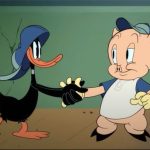

And so we come down to the final strikes and outs. Undoubtedly, there’s been some omissions, and probably several baseball-themed episodes of various series more recent than 2000 (some, for example, including Jimmy Neutron, the Fairly Odd Parents, Teacher’s Pet, and Tom and Jerry, and the strange Pixar television series, “Win or Lose”) that, in accordance with the general timelines of this website, will not appropriately fit for inclusion within this final post. However, I will digress into a handful of fairly recent productions well-deserving attention from classic animation fans, and further include below discussion of two animated features with central baseball themes or sequences. I am also irresistibly drawn to present a random observation for round-table discussion. Why is it that possibly America’s most cherished animated institution, Mickey Mouse, seems to have never engaged in a baseball game on film? He certainly has enough supporting characters to field a team, yet has left all the action for the sport to Goofy. Doesn’t someone need to get busy on this, after all these years?
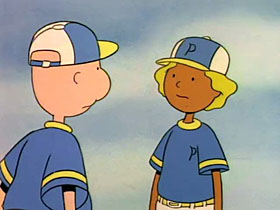 Doug on First (Jumbo Pictures/Nickelodeon, Doug, 5/30/93) – Way too simplistic a plot, and way too few efforts to add any laughs, to make this film at all genuinely entertaining. We’ve practically seen the whole idea before, presented three times as well by The Flintstones. A little league team that’s doing fine by itself, until the parents start interfering to promote the interests of their own kids ahead of the interests of the team – and against the actual desire of their own children. The parents start getting upset that Patti is always the one pitching, thinking their own child can do better, what with heredity and the talent passed down from their doting dads. Figuring the problem is that the kids don’t know how to properly manage a team, the parents take over supervision of the roster, and hold a group meeting to determine a lineup. But they can’t come to any agreement as to who should hold the prime position of pitcher. Doug’s Mom suggests as the only means of compromise that everyone on the team take turns during the game being pitcher. However, most of the players (Doug included) have never pitched in their lives, and would much prefer to be content with their normal positions at the bases or on the field, where they at least feel they know something about what they’re doing. Doug pleads with Dad to stay a first baseman, but all Dad can think of is passing down the legacy of teaching Doug to throw the Funnie Fireball. Doug can see future images of growing up, becoming a professional first baseman, single-handedly winning the World Series, and even winning the Nobel Peace Prize – only to have his father ignore his achievements entirely, and bemoan why his son never became a pitcher to carry Dad’s fireball on in baseball history. When game day arrives, the inexperienced rotation of pitchers perform about as Doug expected – with walks, wild pitches, near-beanings, and repeated lobs to the plate that result in a string of home runs for the opponents. Doug’s turn comes up on the mound, and the batter points to the fence, calling his shot as to where he intends to sock it out of the park. Doug feels the pressure of everyone depending upon him, but is finally honest to himself. “What am I doing here?”, he says aloud – then to the umpire, shouts ‘TIME!” A meeting is held at the mound, and, against the parents’ wishes, Doug hands off the ball to Patti, and takes up his old position at first base. Patti settles in for three straight strikes, silencing those that questioned Doug’s decision, and puts the game under control, allowing the team to achieve a come-from-behind victory without complications or twists. Doug’s Dad finds himself congratulating Patti, then turns to his son. “And as for you – – – if you’re going to play first base, you need a bigger mitt.”
Doug on First (Jumbo Pictures/Nickelodeon, Doug, 5/30/93) – Way too simplistic a plot, and way too few efforts to add any laughs, to make this film at all genuinely entertaining. We’ve practically seen the whole idea before, presented three times as well by The Flintstones. A little league team that’s doing fine by itself, until the parents start interfering to promote the interests of their own kids ahead of the interests of the team – and against the actual desire of their own children. The parents start getting upset that Patti is always the one pitching, thinking their own child can do better, what with heredity and the talent passed down from their doting dads. Figuring the problem is that the kids don’t know how to properly manage a team, the parents take over supervision of the roster, and hold a group meeting to determine a lineup. But they can’t come to any agreement as to who should hold the prime position of pitcher. Doug’s Mom suggests as the only means of compromise that everyone on the team take turns during the game being pitcher. However, most of the players (Doug included) have never pitched in their lives, and would much prefer to be content with their normal positions at the bases or on the field, where they at least feel they know something about what they’re doing. Doug pleads with Dad to stay a first baseman, but all Dad can think of is passing down the legacy of teaching Doug to throw the Funnie Fireball. Doug can see future images of growing up, becoming a professional first baseman, single-handedly winning the World Series, and even winning the Nobel Peace Prize – only to have his father ignore his achievements entirely, and bemoan why his son never became a pitcher to carry Dad’s fireball on in baseball history. When game day arrives, the inexperienced rotation of pitchers perform about as Doug expected – with walks, wild pitches, near-beanings, and repeated lobs to the plate that result in a string of home runs for the opponents. Doug’s turn comes up on the mound, and the batter points to the fence, calling his shot as to where he intends to sock it out of the park. Doug feels the pressure of everyone depending upon him, but is finally honest to himself. “What am I doing here?”, he says aloud – then to the umpire, shouts ‘TIME!” A meeting is held at the mound, and, against the parents’ wishes, Doug hands off the ball to Patti, and takes up his old position at first base. Patti settles in for three straight strikes, silencing those that questioned Doug’s decision, and puts the game under control, allowing the team to achieve a come-from-behind victory without complications or twists. Doug’s Dad finds himself congratulating Patti, then turns to his son. “And as for you – – – if you’re going to play first base, you need a bigger mitt.”
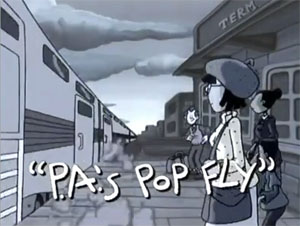 P.A’s Pop Fly (Disney, Pepper Ann, 2/20/00) – Pepper’s dad (in a visitation relationship with his daughter) takes her on an unexpected outing to a baseball game – a sport as to which she has shown no previous interest. The occasion – a player’s anticipated 700th home run, to break a record. Dad recounts how baseball is special to him, having once himself hit a grand slam to win a deciding game in an unknown regional league. At the game, Pepper finds herself surprisedly taking an interest in the events on the field – and the churros from the vendors, As the game goes into overtime, the anticipated long fly ball is hit – right to Pepper’s section. Pepper dives under the ball, and a mob of fans follows. Then, two security guards drag Pepper and her dad away, Pepper with the ball in hand, hustling them to a press conference room. The two are grilled with questions about the incident. Dad, still trying to quite grasp what has happens, responds matter-of-factly that it’s better than a poke in the eye. Pepper is more miffed about being dragged away from the stands, and having missed the ending of the biggest game of the season.
P.A’s Pop Fly (Disney, Pepper Ann, 2/20/00) – Pepper’s dad (in a visitation relationship with his daughter) takes her on an unexpected outing to a baseball game – a sport as to which she has shown no previous interest. The occasion – a player’s anticipated 700th home run, to break a record. Dad recounts how baseball is special to him, having once himself hit a grand slam to win a deciding game in an unknown regional league. At the game, Pepper finds herself surprisedly taking an interest in the events on the field – and the churros from the vendors, As the game goes into overtime, the anticipated long fly ball is hit – right to Pepper’s section. Pepper dives under the ball, and a mob of fans follows. Then, two security guards drag Pepper and her dad away, Pepper with the ball in hand, hustling them to a press conference room. The two are grilled with questions about the incident. Dad, still trying to quite grasp what has happens, responds matter-of-factly that it’s better than a poke in the eye. Pepper is more miffed about being dragged away from the stands, and having missed the ending of the biggest game of the season.
A man introduces himself to Pepper and dad, and indicates that there is a celebrity in their midst that needs representation – the ball. He offers to drive them home in his chauffeured limousine (even though Dad already has his car there, which the man orders an assistant to drive home for him). He explains that he is a sports memorabilia agent, and for a 10% commission, will guarantee mountains of “Franklins” rolling in – enough to put Pepper through ivy league college, fix Dad financially for life, and leave scads of extra cash on the side (with which Pepper envisions purchasing a high-tech laser pointer). Things seem rosy to Dad, but Pepper dreams of using her pointer to interfere with the screen in a movie theater, only to have the vision of the baseball player appear on the screen, and talk to her directly. The player states that Pepper is not being fair to him – selling away something that means his lifetime achievement – and on top of that, for a device she isn’t even supposed to be using in a theater anyway. Pepper gets a bad feeling about going through with a sale, but her Dad still thinks it’s the smart thing to do for financial security, and reminds her that it is tradition for fly balls to be kept by the fans as souvenirs to do with what they like. Dad admits, however, that Pepper’s sentiment is noble – and the thought behind it hits further home when Pepper accidentally encounters her Dad’s old home run ball in the family attic – something Mom claimed she was flushing down the toilet during a fight before their breakup, but now admits that “It wouldn’t flush.” Dad sees the sentiment behind finding his long-lost memento, and realizes Pepper may have a point.
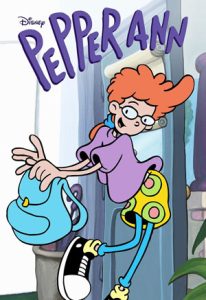 The two pay a visit to the agent’s office, where the ball rests on the desk of the agent, who is playing it cool as a potential buyer offers an exorbitant price. The agent chews and swallows the customer’s written offer, then tells him to try again – with a lot more zeroes. Dad spots among the sports treasures displayed around the office something unusual and out of place – a framed dollar bill. Dad gets the idea that this bill must have some personal significance to the agent. Interrupting the agent’s conversation, Dad proposes, “I’ll give you $100 for this one-dollar bill”. “Not for sale”, responds the agent. “$200?” The agent laughs off the offer again, and explains that was the first dollar bill he ever made in the business. “Then you can understand why we can’t sell away the ball”, responds Dad. The agent remarks, what are they trying to do – collapse his lung? He overturns his entire desk in anger when he finds Dad and Pepper are in earnest. Dad arranges a meeting with the ball player, who is moved to a teary sneeze as the symbol of his life-achievement is returned to him. He reciprocates with tickets for the whole family for the rest of the season, and a large vat of age-old vegetable oil left over from what was his only form of pay during his first season in the minors. The story ends with Mom deciding that with all that vegetable oil, she might as well invite Dad to stay for dinner and a generous helping of fritters – “The older the oil, the more crispy the fritter.”
The two pay a visit to the agent’s office, where the ball rests on the desk of the agent, who is playing it cool as a potential buyer offers an exorbitant price. The agent chews and swallows the customer’s written offer, then tells him to try again – with a lot more zeroes. Dad spots among the sports treasures displayed around the office something unusual and out of place – a framed dollar bill. Dad gets the idea that this bill must have some personal significance to the agent. Interrupting the agent’s conversation, Dad proposes, “I’ll give you $100 for this one-dollar bill”. “Not for sale”, responds the agent. “$200?” The agent laughs off the offer again, and explains that was the first dollar bill he ever made in the business. “Then you can understand why we can’t sell away the ball”, responds Dad. The agent remarks, what are they trying to do – collapse his lung? He overturns his entire desk in anger when he finds Dad and Pepper are in earnest. Dad arranges a meeting with the ball player, who is moved to a teary sneeze as the symbol of his life-achievement is returned to him. He reciprocates with tickets for the whole family for the rest of the season, and a large vat of age-old vegetable oil left over from what was his only form of pay during his first season in the minors. The story ends with Mom deciding that with all that vegetable oil, she might as well invite Dad to stay for dinner and a generous helping of fritters – “The older the oil, the more crispy the fritter.”
• “P.A.’s Pop Fly” is on the Internet Archive.
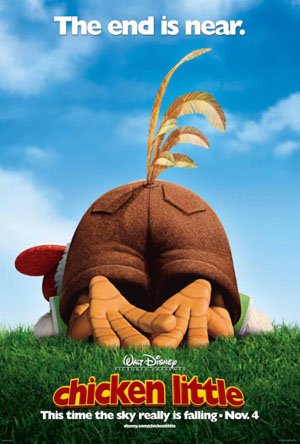 Chicken Little (Disney, 10/30/05) – Disney’s first all-CGI feature includes a moderate length baseball sequence, which really isn’t much of anything new, but is entertainingly presented. Little has faced public embarrassment before the community, and mostly his Dad, when he cannot get anyone to believe that a piece of the sky fell and hit him on the head, (Spoiler: the piece actually turns out to be a panel fallen out from the cloaking device of a flying saucer which has been hovering over the community, with the ability to adapt in camouflage-srtle to the image of anything behind it – in this case, the sky.) To get back in his Dad’s and the community’s good graces, Little vows to excel at something, and ultimately signs up for his nuddle-school’s baseball team. Everyone knows he’s the runt and can’t hit, so he spends the season on the bench, while Foxy Loxy gets all the glory as power hitter. But a championship game finds the coach in the usual kind of trouble. One run behind in the last inning, with a man on base. The roster is exhausted, with most of the team disabled. Someone needs to come up to bat to fill a gap in the lineup, before Foxy Loxy’s spot is due. Send in the bottom of the barrel – Little. The usual instruction – don’t swing, they can’t find your strike zone. The usual counter-resolve from Little, that this will be his day to show everybody. Two balls, two swings – counted as strikes instead of working toward a walk. Coach and community are furious. Little still swings on the last pitch, and gets a hit to the outfield. The outfielders are all busy. A dog in left field has been passing the time with something better to do – chasing his tail. A cow in center field satisfies the pangs of his second stomach by grazing. And a mole in right field is underground, digging for grubs. The fly ball catches them all by surprise, and is fumbled. On the second bounce, they can’t find it, as it has become stuck on the end of one of the cow’s horns. The other two fielders pick up the cow bodily, and charge with her toward the mound to beat Little (who should have already been there by now, but started out his base running the wrong way, almost blocking off the other scoring base runner). The usual race for the plate, and Little’s slide. When the action stops, the umpire finds Little sitting on one end of a pile of dirt piled up upon the plate, seen only from his top half, which appears to be about two feet short of the plate, and one of the fielders standing atop the dirt to apply a tag of the ball. However, the play isn’t over yet, as the umpire uses his brush to dust off the plate – revealing under the dirt that Little’s foot is extended, in firm contact with home. The team wins, without Foxy Loxy’s help, and Little is temporarily redeemed in the town’s eyes – that is, at least until the next falling of a pirce of the sky, to repeat the embarrassment and further develop the alien angle of the plot.
Chicken Little (Disney, 10/30/05) – Disney’s first all-CGI feature includes a moderate length baseball sequence, which really isn’t much of anything new, but is entertainingly presented. Little has faced public embarrassment before the community, and mostly his Dad, when he cannot get anyone to believe that a piece of the sky fell and hit him on the head, (Spoiler: the piece actually turns out to be a panel fallen out from the cloaking device of a flying saucer which has been hovering over the community, with the ability to adapt in camouflage-srtle to the image of anything behind it – in this case, the sky.) To get back in his Dad’s and the community’s good graces, Little vows to excel at something, and ultimately signs up for his nuddle-school’s baseball team. Everyone knows he’s the runt and can’t hit, so he spends the season on the bench, while Foxy Loxy gets all the glory as power hitter. But a championship game finds the coach in the usual kind of trouble. One run behind in the last inning, with a man on base. The roster is exhausted, with most of the team disabled. Someone needs to come up to bat to fill a gap in the lineup, before Foxy Loxy’s spot is due. Send in the bottom of the barrel – Little. The usual instruction – don’t swing, they can’t find your strike zone. The usual counter-resolve from Little, that this will be his day to show everybody. Two balls, two swings – counted as strikes instead of working toward a walk. Coach and community are furious. Little still swings on the last pitch, and gets a hit to the outfield. The outfielders are all busy. A dog in left field has been passing the time with something better to do – chasing his tail. A cow in center field satisfies the pangs of his second stomach by grazing. And a mole in right field is underground, digging for grubs. The fly ball catches them all by surprise, and is fumbled. On the second bounce, they can’t find it, as it has become stuck on the end of one of the cow’s horns. The other two fielders pick up the cow bodily, and charge with her toward the mound to beat Little (who should have already been there by now, but started out his base running the wrong way, almost blocking off the other scoring base runner). The usual race for the plate, and Little’s slide. When the action stops, the umpire finds Little sitting on one end of a pile of dirt piled up upon the plate, seen only from his top half, which appears to be about two feet short of the plate, and one of the fielders standing atop the dirt to apply a tag of the ball. However, the play isn’t over yet, as the umpire uses his brush to dust off the plate – revealing under the dirt that Little’s foot is extended, in firm contact with home. The team wins, without Foxy Loxy’s help, and Little is temporarily redeemed in the town’s eyes – that is, at least until the next falling of a pirce of the sky, to repeat the embarrassment and further develop the alien angle of the plot.
• “Chicken Little” is viewable on ok.ru
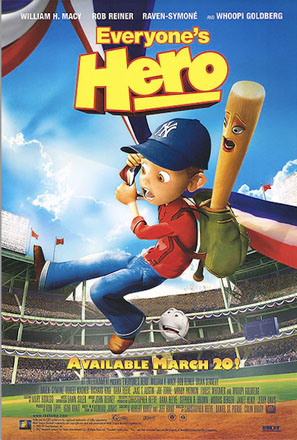 Everybody’s Hero – (IDT Entertainment/Fox, 9/13/06) – “Yankee” Irving is your typical average kid in the years of the Great Depression. He lives in the poorer neighborhoods of New York, and idolizes his hometown hero, Babe Ruth of the Yankees. He has more of a connection to this life than most kids – at least by relationship – as his dad is an underpaid groundskeeper/custodian at Yankee Stadium, just glad to be gainfully employed. But for all of this baseball connection in his life, Irving us about as far as possible from following in the footsteps of his heroes. He is short, unskilled, and the last person to be chosen for games by the sandlot teams of the backstreets. When told not to swing so as to draw a walk, he theorizes, “How will anyone know if I can swing if I don’t try?” – and of course strikes out. Dejected and feeling friendless, he begins his walk homeward, but spots a forgotten baseball near the field. Bringing it home, his surprises soon begin.
Everybody’s Hero – (IDT Entertainment/Fox, 9/13/06) – “Yankee” Irving is your typical average kid in the years of the Great Depression. He lives in the poorer neighborhoods of New York, and idolizes his hometown hero, Babe Ruth of the Yankees. He has more of a connection to this life than most kids – at least by relationship – as his dad is an underpaid groundskeeper/custodian at Yankee Stadium, just glad to be gainfully employed. But for all of this baseball connection in his life, Irving us about as far as possible from following in the footsteps of his heroes. He is short, unskilled, and the last person to be chosen for games by the sandlot teams of the backstreets. When told not to swing so as to draw a walk, he theorizes, “How will anyone know if I can swing if I don’t try?” – and of course strikes out. Dejected and feeling friendless, he begins his walk homeward, but spots a forgotten baseball near the field. Bringing it home, his surprises soon begin.
This production, despite providing a few smiles and average-level entertainment, suffers from a number of developmental flaws – a major one of which is no explanation for the surprise revelation that the ball Irving has retrieved from the dust can somehow talk – like Paramount’s “Abner the Baseball”, but for no particular reason can be heard only by Irving. Carl Reiner does his best to breathe life into his performance as the voice of Screwie (the ball), with a nearly-never-ending flow of wise cracks and complaints about the lunatic kid who disturbed his simple desires to decompose in peace. Screwie attempts to escape Irving’s room, but Irving learns he can be successfully confined for safe-keeping within Irving’s underwear drawer. It eventually is revealed by Screwie that his philosophy is that baseball is “a field of broken dreams” (an incongruous reference to Kevin Costner’s film “Field of Dreams”, although the story is supposed to take place in the mid 1930’s, long before the movie referenced). Screwie had life aspirations like all of his kind of being a home run ball, and actually made it into the majors for a chance to be hit. He was clouted all right, on a single pitch, right over the wall – but hit foul. No one ever even came to find him after the game. Irving nevertheless hangs onto him.
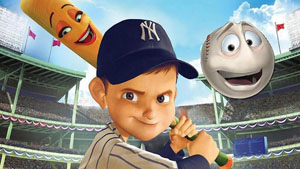 The next day finds some baseball dreams still left in Irving, as his Mom allows him a rare chance to deliver lunch to his Dad at the stadium. During his visit, Irving slips over a fence onto the field, and stands for the first time at the plate where the real players play. His Dad meets him, and hears of his loss in yesterday’s game, but gives him some words of encouragement to do like the team members do, and keep on swinging. As a special treat, Dad does something he’s never allowed Irving to experience before, taking Irving into the unoccupied Yankee locker room. There, Irving gets a view of Babe Ruth’s personal and favorite bat – a custom made stick supposedly carved from a tree limb from Mount Olympus (though Dad believes it was really made in Kentucky), which Babe has nicknamed “Darlin’”. (The real Babe for several years had a favorite bat, nicknamed “Old Sam”, but was not allowed to keep it after a few seasons, the league believing that something in the glue holding sections of the bat together might unfairly give him an edge in his swinging.)
The next day finds some baseball dreams still left in Irving, as his Mom allows him a rare chance to deliver lunch to his Dad at the stadium. During his visit, Irving slips over a fence onto the field, and stands for the first time at the plate where the real players play. His Dad meets him, and hears of his loss in yesterday’s game, but gives him some words of encouragement to do like the team members do, and keep on swinging. As a special treat, Dad does something he’s never allowed Irving to experience before, taking Irving into the unoccupied Yankee locker room. There, Irving gets a view of Babe Ruth’s personal and favorite bat – a custom made stick supposedly carved from a tree limb from Mount Olympus (though Dad believes it was really made in Kentucky), which Babe has nicknamed “Darlin’”. (The real Babe for several years had a favorite bat, nicknamed “Old Sam”, but was not allowed to keep it after a few seasons, the league believing that something in the glue holding sections of the bat together might unfairly give him an edge in his swinging.)
Irving is left to linger alone a few minutes in awe of Babe’s bat, with the promise to lock up as he leaves. Irving almost gets a chance to lay a finger on the bat handle – but is abruptly interrupted by what appears to be a security guard, who orders Irving out of the locker room in cross and curt fashion. Irving leaves hurriedly, forgetting to lock things as promised. Little does he realize that a plot is afoot. The “guard” is no guard at all, but a pitcher presently cut from the roster of the rival Chicago Cubs, nicknamed “Lefty”. The Cubs are in the course of a matchup with the Yankees for the World Series, in which Babe has scored the winning runs in the first few games. Chicago’s owner has hatched a scheme with Lefty – steal Darlin’, taking away Babe’s magic charm, so that the Cubs can come back and win. Unseen by anyone, Lefty, recruited for the heist on promise of being reinstated into the lineup as a reward, carries out the foul deed. (Another complete time incongruity is worth mentioning here, as the Chicago owner has a pastime of demolishing Babe Ruth bobble-heads as a symbol of his hatred for Ruth – except that bobble-heads weren’t a part of the promotional fare of baseball for several decades to come.)
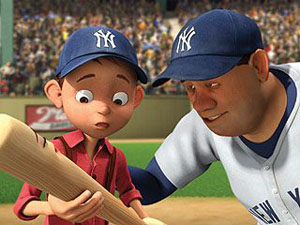 Police and the Yankee manager appear at Irving’s Dad’s doorstep the next morning. They can find no trace of the missing bat with Dad or Irving, but lay blame for the loss upon Dad’s carelessness. Dad is fired – at least until his name can be cleared by return of the bat. Something was familiar about the face of the “guard” Irving saw yesterday, though Dad denies there was any guard on duty, and will not believe Irving’s story. Irving digs into his back collection of baseball cards, and locates last-season’s card on Lefty, identifying the perpetrator. Knowing that both teams are heading for Chicago for the next game, Irving and Screwie stake out the train station for the inevitable sign of Lefty, finally spotting him carrying a case large enough to conceal the bat within. Irving ducks within a boarding troop of scouts, and gets aboard. Screwie runs reconnaissance, rolling under the train seats until he can spot which seat Lefty is occupying. A madcap chase ensues as Irving makes off with the case, involving several instances of train-hopping between two trains running side-by-side on parallel tracks, and a good-deal of ducking (and sometimes failing to duck) obstacles passing above and between the train cars by Lefty. Lefty is ultimately knocked cold by a switch light between the two tracks, and Irving and Screwie abandon their train several stations later, Irving intending to take a return trip to New York to clear his father’s name.
Police and the Yankee manager appear at Irving’s Dad’s doorstep the next morning. They can find no trace of the missing bat with Dad or Irving, but lay blame for the loss upon Dad’s carelessness. Dad is fired – at least until his name can be cleared by return of the bat. Something was familiar about the face of the “guard” Irving saw yesterday, though Dad denies there was any guard on duty, and will not believe Irving’s story. Irving digs into his back collection of baseball cards, and locates last-season’s card on Lefty, identifying the perpetrator. Knowing that both teams are heading for Chicago for the next game, Irving and Screwie stake out the train station for the inevitable sign of Lefty, finally spotting him carrying a case large enough to conceal the bat within. Irving ducks within a boarding troop of scouts, and gets aboard. Screwie runs reconnaissance, rolling under the train seats until he can spot which seat Lefty is occupying. A madcap chase ensues as Irving makes off with the case, involving several instances of train-hopping between two trains running side-by-side on parallel tracks, and a good-deal of ducking (and sometimes failing to duck) obstacles passing above and between the train cars by Lefty. Lefty is ultimately knocked cold by a switch light between the two tracks, and Irving and Screwie abandon their train several stations later, Irving intending to take a return trip to New York to clear his father’s name.
While waiting at a remote station for a train back to New York, Irving and Screwie finally investigate the contents of the case. The bat is within – but to everyone’s shock (and again, without a word of explanation), the bat, which now has a face, screams in a woman;s voice – that of Whoopi Goldberg. Again, Irving, and even Screwie, can hear her, but no one else can. Darlin’ turns out to be a spoiled prima donna, centered upon herself and her relationship with the Babe, who she repeatedly states needs her. She further takes an instant disliking to Screwie, whom she treats as below her dignity, coarse and crude – especially when she learns that he never made anything of himself except a foul ball. She further attempts to talk Irving into continuing on to Chicago to reunite her with Babe, rather than return to New York to immediately clear his father’s job (also stepping on the plans of Screwie, who had made a deal with Irving in return for assisting in helping to locate Lefty and the bat, to be returned to the sandlot to rot in peace).
Lefty appears again, having caught up by following the tracks, and more perilous chasing ensues, with Lefty retreating on a hand car, one railroad tie ahead of the cowcatcher of an oncoming train. Realizing how desperate Chicago is to louse up the Babe’s series, Irving finally agrees to continue on to Chicago first, and restore to Babe his rightful property.
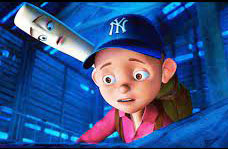 Other incidents in Irving’s journey include a stopover to find something to eat, in which Irving receives an assist from a young black girl when bullies attempt to snatch Screwie away. The girl is a dead-shot in pitching apples from a tree, and even gives Irving some pointers as the two of them repel the bullies. She learned from her dad, who is a professional pitcher in the Negro League, and whose team bus just happens to also be heading for Chicago. Irving gets some free transportation on the team bus, and in a game of “shadow ball” during the trip, Irving receives more instruction upon proper batting stance. Even Screwie, who gets tossed around, finds for the first time that he’s starting to have some fun being in play.
Other incidents in Irving’s journey include a stopover to find something to eat, in which Irving receives an assist from a young black girl when bullies attempt to snatch Screwie away. The girl is a dead-shot in pitching apples from a tree, and even gives Irving some pointers as the two of them repel the bullies. She learned from her dad, who is a professional pitcher in the Negro League, and whose team bus just happens to also be heading for Chicago. Irving gets some free transportation on the team bus, and in a game of “shadow ball” during the trip, Irving receives more instruction upon proper batting stance. Even Screwie, who gets tossed around, finds for the first time that he’s starting to have some fun being in play.
Irving finally meets the Babe in the dining room of a fancy hotel where the Yankees are staying before the final game. Despite having lost three games in a row, Babe tells the press that in baseball, anything can happen. Babe graciously permits Irving to approach the table, and listens to his story about the theft of the bat. But Lefty has also made it to the hotel, spots Irving, and switches the bat for a large loaf of bread, throwing off the credibility of Irving’s story. Irving and Screwie attempt to pursue Lefty again (with another incongruity of Screwie calling himself “Superball”, although Superman also did not exist in the Depression years), but are grabbed up by the Chicago owner, and whisked away in his limousine, to be locked in the stadium executive office as play gets underway. Screwie asks to do something that baseballs are known for – to break a window – and is thrown through the booth window by Irving, leading to the field. Lefty and Darlin’ are located, and ultimately, Irving delivers the bat back to Babe. But the team is down by seven runs, and Babe has already had what seems to be his last at bat. The demoralized team is ordered to produce their next batter at the plate within two minutes or forfeit the series. Babe proposes an idea which at this point can’t hurt – since Irving brought about a miracle in returning Darlin’, why not reward him with the miracle opportunity to bat in the World Series? Screwie finds himself in play, and Babe lets Irving take Darlin’ to the plate for his swing. Irving hesitates, knowing Babe is the only one who has known how to use the magic of Darlin’ before, but Babe shares a secret with him – that the magic comes not from the bat, but the batter.
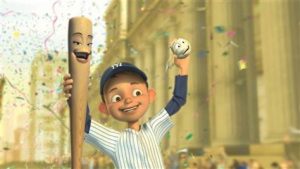 Lefty is already on the mound, as reward for keeping Babe from at least using Darlin’ during the game. The Chicago owner tells him to just go for the easy strikeout of the kid. But Irving remembers the pointers he received from everyone, including his Dad’s advice to “Just keep swinging.” He is further encouraged when he spots Dad and Mom in the stands rooting for him, having followed to Chicago to find him. Thus, Irving connects with the third pitch. Screwie thinks he finally has the elevation to leave the park a fair ball – but comes almost straight down, only a short distance into the infield. Irving runs – and an improbable series of multiple fielding errors takes place, allowing Irving to circle the bases without a tag. Lefty covers the plate, but Irving takes a jumping hop instead of a slide, landing with his foot on the side of Lefty’s face (wouldn’t this be some kind of violation for the umps to call?), then rebounds off in another bounce, landing on home plate by the seat of his pants. The run scores, and Screwie is a home-run ball after all – even if inside-the-park. The revitalized Yankees stage a rally with their last out, and go around the rotation, with Babe coming up again to bat a three-run homer with Darlin’ that decides the game. Lefty and the Chicago owner receive sentences and prison stripes, while Irving rides with Babe as an honorary member of the team in a ticker-tape parade.
Lefty is already on the mound, as reward for keeping Babe from at least using Darlin’ during the game. The Chicago owner tells him to just go for the easy strikeout of the kid. But Irving remembers the pointers he received from everyone, including his Dad’s advice to “Just keep swinging.” He is further encouraged when he spots Dad and Mom in the stands rooting for him, having followed to Chicago to find him. Thus, Irving connects with the third pitch. Screwie thinks he finally has the elevation to leave the park a fair ball – but comes almost straight down, only a short distance into the infield. Irving runs – and an improbable series of multiple fielding errors takes place, allowing Irving to circle the bases without a tag. Lefty covers the plate, but Irving takes a jumping hop instead of a slide, landing with his foot on the side of Lefty’s face (wouldn’t this be some kind of violation for the umps to call?), then rebounds off in another bounce, landing on home plate by the seat of his pants. The run scores, and Screwie is a home-run ball after all – even if inside-the-park. The revitalized Yankees stage a rally with their last out, and go around the rotation, with Babe coming up again to bat a three-run homer with Darlin’ that decides the game. Lefty and the Chicago owner receive sentences and prison stripes, while Irving rides with Babe as an honorary member of the team in a ticker-tape parade.
More a dream fantasy for the smaller audience than an overall crowd-pleaser, the film made less than half its investment from theatrical release. Like Screwie and Irving, the producers just couldn’t hit one out of the park on this title.
• “Everybody’s Hero” is on ok.ru.
 Baseball (RJ Animation, Bernard, 2006) is a well made, well-timed Korean CGI short, styles to look much like stop motion, played entirely in pantomime. The film reminds me so much of the kind of material that might have graced a classic MGM Barney Bear cartoon, with a cast of one – or perhaps, two – Bernard Bear, and a pitching machine. Bernard books a batting practice enclosure, consisting of a fenced tennis court-style lot, a plate and backstop, the pitching machine, and an outfield fence and scoreboard. He steps up to the plate, rarin’ to go, but nothing happens. Of course not – he forgot to flick on the power switch from a box mounted on the enclosure wall. He turns it on, but before he can even get turned around, is surprised to have a ball whiz by him, hitting the backstop. Bernard sets himself into position in the batter’s box, but again, before he can barely lift the bat to his shoulder, another ball gets by. A little embarrassed and frustrated at this humiliation, Bernard finally gets in a swing, and launches one over the fence. He smiles at his accomplishment, but the machine evens the score by sailing another one by him before he can savor the moment. Bernard really starts to “bear down”, and begins to get the hang of the machine’s timing, socking about a half-dozen successive homers over the wall. As happened on more than one occasion with his predecessor Barney, Bernard begins to show off, switching hands to bat righty and lefty, turning his back on the machine to hit over the shoulder, hitting one ball in the style of a pool cue, and even one hit between his own legs.
Baseball (RJ Animation, Bernard, 2006) is a well made, well-timed Korean CGI short, styles to look much like stop motion, played entirely in pantomime. The film reminds me so much of the kind of material that might have graced a classic MGM Barney Bear cartoon, with a cast of one – or perhaps, two – Bernard Bear, and a pitching machine. Bernard books a batting practice enclosure, consisting of a fenced tennis court-style lot, a plate and backstop, the pitching machine, and an outfield fence and scoreboard. He steps up to the plate, rarin’ to go, but nothing happens. Of course not – he forgot to flick on the power switch from a box mounted on the enclosure wall. He turns it on, but before he can even get turned around, is surprised to have a ball whiz by him, hitting the backstop. Bernard sets himself into position in the batter’s box, but again, before he can barely lift the bat to his shoulder, another ball gets by. A little embarrassed and frustrated at this humiliation, Bernard finally gets in a swing, and launches one over the fence. He smiles at his accomplishment, but the machine evens the score by sailing another one by him before he can savor the moment. Bernard really starts to “bear down”, and begins to get the hang of the machine’s timing, socking about a half-dozen successive homers over the wall. As happened on more than one occasion with his predecessor Barney, Bernard begins to show off, switching hands to bat righty and lefty, turning his back on the machine to hit over the shoulder, hitting one ball in the style of a pool cue, and even one hit between his own legs.
One such hit goes slightly off in aim, and instead of a home run, hits the machine. There is an odd grinding sound heard from the mechanism, and Bernard grunts as if to say, “That doesn’t sound good”. Suddenly, two balls fly out of the machine in rapid succession. Bernard addresses one, but has his hat knocked off by the other. As Berbard stoops for his hat, he takes another pitch in the rear. Turning around, he receives another in the gut (possibly low enough to be in a place that really hurts). Bernard begins dodging pitches left, right, up, and down, finally flopping on his back and going into a spin, his moves resembling a breakdance in his efforts to avoid injury. The plate area is getting covered in baseballs, and Bernard stumbles on one, then attempts to regain his balance from a position bent over under the power box on the wall. His head comes up under the power switch, accidentally, but fortunately, flicking the switch into off position. The barrage of baseballs abruptly stops. Bernard breathes a sigh of relief, and attempts to relax, leaning his elbow with intent to rest it upon the power box. His elbow misses the box, and flicks the power back on instead. As Bernard takes more direct hits, he struggles to push the switch back the other way – but the device is stuck. He uses all his force – and busts the entire box and switch off the wall, with the machine still running. Bernard holds the disconnected box in front of himself like a shield to ward off a few more balls, then, in desperation, picks up his bat and charges the mound. He succeeds in jamming the handle of his bat into the mouth of the pitching machine, toppling the machine backwards in the process. With the machine seemingly silenced, Bernard positions himself backwards between the legs of the machine, and attempt to pull it forward to right it. Instead, his fat body gets trapped between the machine’s legs, just as the machine springs to life again, building up force within to eject the bat forcibly with a shot skyward, followed by three more balls. Unable to move from his position, Bernard takes the blows first from the three balls falling on his head, then a solid bop from the bat. Bernard keels over backwards upon the barrel of the pitching machine, and rests there, knocked cold, as an endless supply of further balls continue to emerge from the pitching barrel to repeatedly bop Bernard on the back of the head. A guaranteed belly-laugh producer.
Finally, two recent shorts from Warner’s/MAX’s “Looney Tunes Cartoons” series, reviving in classic or near-classic form the antics of Bugs, Daffy, and Porky. We’ll take them in reverse-chronological order, to allow Bugs to “wind this up with a bang”.
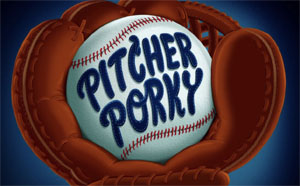 Pitcher Porky (Looney Tunes Cartoons (Porky and Daffy), 1/21/21 – David Gemmill, dir.) – The Gas House Gorillas are again in a game against a team of pushovers – the Cutie Pies. Typical score: 401 to nothing. Everybody from the Cutie Pies’ bench seems to be in traction, and their current pitcher throws one pitch, which returns as a comebacker, knocking him backwards into the open doors of a waiting ambulance. Only one player remains on the roster – Porky Pig, warming up his pitching arm, with a throw that lands with a plop after a flight of three feet – his new personal record. With nowhere else to turn, the manager orders Porky onto the field. Bat boy Daffy Duck vigorously shakes Porky’s right hand as congratulations for finally getting to play in his first game – and snaps Porky’s pitching arm into the sagging shape of a wet noodle. How can Porky pitch like this? Daffy paces the dugout, and comes up with a master plan.
Pitcher Porky (Looney Tunes Cartoons (Porky and Daffy), 1/21/21 – David Gemmill, dir.) – The Gas House Gorillas are again in a game against a team of pushovers – the Cutie Pies. Typical score: 401 to nothing. Everybody from the Cutie Pies’ bench seems to be in traction, and their current pitcher throws one pitch, which returns as a comebacker, knocking him backwards into the open doors of a waiting ambulance. Only one player remains on the roster – Porky Pig, warming up his pitching arm, with a throw that lands with a plop after a flight of three feet – his new personal record. With nowhere else to turn, the manager orders Porky onto the field. Bat boy Daffy Duck vigorously shakes Porky’s right hand as congratulations for finally getting to play in his first game – and snaps Porky’s pitching arm into the sagging shape of a wet noodle. How can Porky pitch like this? Daffy paces the dugout, and comes up with a master plan.
Porky appears on the mound, but with an added passenger. Daffy is concealed inside his shirt, sitting on Porky’s belly-button. Whipping out a shaver and a can of shaving cream, Daffy shaves the feathers off his right arm until it is smooth as silk, and sticks it out of Porky’s sleeve, to take over the throwing chores. Daffy first serves up a “stink-ball”, padding a hollow horsehide with old socks, rotten eggs, and other odiferous ingredients, the stench of which causes the batter to dissolve into a puddle at the plate. The next batter receives a talking baseball which Daffy has slapped around to make it irritable. The ball shouts out a string of insults at the batter, until the player leaves bawling and in tears, because that mean ol’ ball hurt his feelings, and he doesn’t want to play anymore. A third batter gets an original pitch which it’s surprising no one came up with before this. The ball stops and hovers before the batter. The batter leans closer to inspect – and gets socked right in the jaw by Daffy’s fist protruding from the ball. Daffy addresses the camera, showing off his secret weapon: “You might have heard of knuckle balls – but mine’s made of brass.” But, as the Gorillas’ power hitter steps up to the plate. Daffy tries a new technique that backfires. He pours glue on the ball to place the batter in a sticky situation. Instead, the glue sticks to Daffy’s hand, pulling him out of Porky’s sleeve to travel along with the ball to the plate – and be belted by the batter over the foul line. Daffy crashes through the outfield wall, and shouts “Foul ball”, as a few last bricks from the wall land upon his head, knocking him cold.
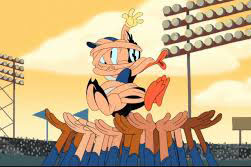 Porky, now left with only his own sagging arm, panics at what to do. If only Daffy were here. Then a brainstorm hits. If he wants to pitch like Daffy, he has to think like Daffy. Porky closes his eyes in great internal concentration, as a cutaway view of his brain reveals his gray matter shaking, trembling, then finally sprouting a duck beak which shouts, “Woo Woo!” Porky’s eyes spin within multicolor circles, and he begins to act like the lunatic duck, twirling his shapeless, rubberized arm within his opposite hand like a lariat, and letting loose with a toss, for strike two. Another “Daffy” pitch has Porky compress his ribbon arm like a coiled spring, to launch a third pitch at the plate. The batter misses for the third strike, but swings so hard, he takes off as of his bat were an airplane propeller. He soars over Porky’s head, hitting the outfield scoreboard head-on, and drilling a gaping hole through it. The impact knocks all the numbers loosely hanging from the Gorillas’ half of the scoreboard off their pins, except for the center number “0″ on the total score, while the “1″ from the Gorillas’ total falls to land on a pin on the Cutie Pies’ side, leaving the score reading Cuties 1, Gorillas 0. Daffy revives, shouting congratulations to Porky for winning the game, and the two are hoisted onto their teammates’ shoulders for a carry off the field. “High five”, the two shout to each other in unison – except Porky mistakenly uses his broken rubber-hose arm to make the impact. The arm whips around, stretches out a mile, and comes back around, tying up our two heroes together in knotted loops, for the iris out.
Porky, now left with only his own sagging arm, panics at what to do. If only Daffy were here. Then a brainstorm hits. If he wants to pitch like Daffy, he has to think like Daffy. Porky closes his eyes in great internal concentration, as a cutaway view of his brain reveals his gray matter shaking, trembling, then finally sprouting a duck beak which shouts, “Woo Woo!” Porky’s eyes spin within multicolor circles, and he begins to act like the lunatic duck, twirling his shapeless, rubberized arm within his opposite hand like a lariat, and letting loose with a toss, for strike two. Another “Daffy” pitch has Porky compress his ribbon arm like a coiled spring, to launch a third pitch at the plate. The batter misses for the third strike, but swings so hard, he takes off as of his bat were an airplane propeller. He soars over Porky’s head, hitting the outfield scoreboard head-on, and drilling a gaping hole through it. The impact knocks all the numbers loosely hanging from the Gorillas’ half of the scoreboard off their pins, except for the center number “0″ on the total score, while the “1″ from the Gorillas’ total falls to land on a pin on the Cutie Pies’ side, leaving the score reading Cuties 1, Gorillas 0. Daffy revives, shouting congratulations to Porky for winning the game, and the two are hoisted onto their teammates’ shoulders for a carry off the field. “High five”, the two shout to each other in unison – except Porky mistakenly uses his broken rubber-hose arm to make the impact. The arm whips around, stretches out a mile, and comes back around, tying up our two heroes together in knotted loops, for the iris out.
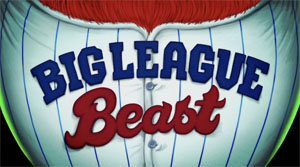 Big League Beast (Warner, Looney Tunes Cartoons (Bugs Bunny), 5/27/20 – Kenny Pittenger, dir.) – On a stormy afternoon, Bugs sits semi-comfortably in his dripping-roof rabbit hole, wearing a baseball cap and an oversize foam rooter’s glove, attempting to watch a big game of baseball on a small TV set. Just as the first pitch is thrown, everything goes black and silent, except for the blinking of Bugs’ frustrated eyes in the darkness. Bugs pops his head out of the hole, and attempts to adjust some metal rods protruding from the soil next to his entrance. “Darn these rabbit ears”, complains Bugs. He wonders how he’ll ever get to see the game – until his eyes spot a venue he’s visited at least once before – the castle of the local evil scientist, straight out of “Water, Water, Every Hare”. Bugs eyes a large ray-gun apparatus on the castle roof, with a deep-dish projection plate at the rear of its barrel, and mistakes it for something useful – the ultimate in satellite dishes. A few seconds later, Bugs is knocking on the castle door, disrupting the current evil thoughts of said scientist (the Vincent Price-type who also appeared in “Water, Water”). Bugs quickly introduces himself as a fellow baseball fan, rattles off his power predicament, and barges in with a flurry of fast-talk to enjoy the game with the scientist (taking the further liberty of grabbing “refreshments” from a refrigerator, though it appears that at least some of the device’s contents are not food, but chemical potions, and a popcorn-size bucket that bears the universal symbol for radioactive materials). “And so it begins”, murmers the disgruntled scientist to himself, and climbs a staircase to a tall tower and a sheet-covered operating table, to pull an electric switch. Up from the table rises Bugs’ old nemesis, Gossamer the monster, ready to do his worst.
Big League Beast (Warner, Looney Tunes Cartoons (Bugs Bunny), 5/27/20 – Kenny Pittenger, dir.) – On a stormy afternoon, Bugs sits semi-comfortably in his dripping-roof rabbit hole, wearing a baseball cap and an oversize foam rooter’s glove, attempting to watch a big game of baseball on a small TV set. Just as the first pitch is thrown, everything goes black and silent, except for the blinking of Bugs’ frustrated eyes in the darkness. Bugs pops his head out of the hole, and attempts to adjust some metal rods protruding from the soil next to his entrance. “Darn these rabbit ears”, complains Bugs. He wonders how he’ll ever get to see the game – until his eyes spot a venue he’s visited at least once before – the castle of the local evil scientist, straight out of “Water, Water, Every Hare”. Bugs eyes a large ray-gun apparatus on the castle roof, with a deep-dish projection plate at the rear of its barrel, and mistakes it for something useful – the ultimate in satellite dishes. A few seconds later, Bugs is knocking on the castle door, disrupting the current evil thoughts of said scientist (the Vincent Price-type who also appeared in “Water, Water”). Bugs quickly introduces himself as a fellow baseball fan, rattles off his power predicament, and barges in with a flurry of fast-talk to enjoy the game with the scientist (taking the further liberty of grabbing “refreshments” from a refrigerator, though it appears that at least some of the device’s contents are not food, but chemical potions, and a popcorn-size bucket that bears the universal symbol for radioactive materials). “And so it begins”, murmers the disgruntled scientist to himself, and climbs a staircase to a tall tower and a sheet-covered operating table, to pull an electric switch. Up from the table rises Bugs’ old nemesis, Gossamer the monster, ready to do his worst.
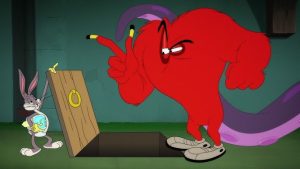 Bugs fine-tunes one of those televiewer scanners as used by the Peter Lorre mad scientist in “Hare-Raising Hare” to finally get the ball game on the screen, and backs himself to settle into what he thinks is a comfortable chair in front of the set. But the “chair” is tall, red, and fuzzy – he is sitting in Gossamer’s lap. Bugs undergoes some of those distorted shock-takes similar to his first sighting of Gossamer in “Hare-Raising”, letting the contents of his soda pop bottle spill out on the floor, then breaks from his fits long enough to tell the audience that he has a feeling he might miss the 7th inning stretch. Bugs climbs into Gossamer’s hair, and plays a game of hide and seek with the monster amidst his follicles. Gossamer is forced to take up an electric shaver, and starts making slashes with it at himself to try to locate the elusive rabbit, cutting large gashes out of his own form – until he finally shaves away everything but his sneakers, red hair falling in a heap upon the floor. Bugs appears with a trash can and dustpan, and sweeps up the mess to dispose of it with a quick bathroom flush. (Doesn’t he know hair can clog a drain?) A soggy Gossamer reassembles himself, ready for more.
Bugs fine-tunes one of those televiewer scanners as used by the Peter Lorre mad scientist in “Hare-Raising Hare” to finally get the ball game on the screen, and backs himself to settle into what he thinks is a comfortable chair in front of the set. But the “chair” is tall, red, and fuzzy – he is sitting in Gossamer’s lap. Bugs undergoes some of those distorted shock-takes similar to his first sighting of Gossamer in “Hare-Raising”, letting the contents of his soda pop bottle spill out on the floor, then breaks from his fits long enough to tell the audience that he has a feeling he might miss the 7th inning stretch. Bugs climbs into Gossamer’s hair, and plays a game of hide and seek with the monster amidst his follicles. Gossamer is forced to take up an electric shaver, and starts making slashes with it at himself to try to locate the elusive rabbit, cutting large gashes out of his own form – until he finally shaves away everything but his sneakers, red hair falling in a heap upon the floor. Bugs appears with a trash can and dustpan, and sweeps up the mess to dispose of it with a quick bathroom flush. (Doesn’t he know hair can clog a drain?) A soggy Gossamer reassembles himself, ready for more.
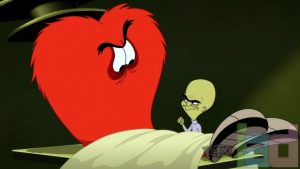 Bugs begins to engage in his usual games of distraction. When Gossamer wrecks another screen on which Bugs is tuning in the game, Bugs brings the chase to a screeching halt by reacting aghast at those jumbo tennis shoes Gossamer always wears – how out of style can you get? Assuming the role of a shoe salesman, Bugs pulls in a rack of his latest models – and soon has Gossamer fitted in high heels, and strutting his stuff as if he were on a fashion runway. Bugs drapes a victory banner reading “Miss Gruesomeverse” across Gossamer’s waist and shoulder, and adds the touch of a large bouquet of roses in Gossamer’s hand – which flowers wilt to reveal a stash of lit dynamite sticks hidden within. The explosion turns Gossamer’s upper half into a charcoal singe, with a small pair of fiery-red eyes resting in the middle. Bugs also pulls a clever twist upon an old setup used in both “Hare-Raising Hare” and “Water, Water” – the old trap-door in the castle floor leading to a pit bit. This time, Bugs is not the one facing falling in – but instead arrives first at a closed trap door, opening it up in Gossamer’s path. Gossamer slams on the brakes, narrowly avoiding taking the dive. Bugs evades him by running past him back the other way. Gossamer quickly turns to pursue, but Bugs has opened another previously-unseen second trap door ahead of Gossamer as he turns. More narrowly, Gossamer again stops short of taking the fall, and wags a finger at Bugs cautioningly, as if to say, “Now don’t do that”. But Gossamer just can’t avoid his fate – as the huge tentacle of a giant octopus from the first pit reaches out from the first trap door, dragging Gossamer in – and the mammoth vibrations from the floor tell the rest as to what is happening to Gossamer. “How does that grab ya’, Doc?”, laughs Bugs.
Bugs begins to engage in his usual games of distraction. When Gossamer wrecks another screen on which Bugs is tuning in the game, Bugs brings the chase to a screeching halt by reacting aghast at those jumbo tennis shoes Gossamer always wears – how out of style can you get? Assuming the role of a shoe salesman, Bugs pulls in a rack of his latest models – and soon has Gossamer fitted in high heels, and strutting his stuff as if he were on a fashion runway. Bugs drapes a victory banner reading “Miss Gruesomeverse” across Gossamer’s waist and shoulder, and adds the touch of a large bouquet of roses in Gossamer’s hand – which flowers wilt to reveal a stash of lit dynamite sticks hidden within. The explosion turns Gossamer’s upper half into a charcoal singe, with a small pair of fiery-red eyes resting in the middle. Bugs also pulls a clever twist upon an old setup used in both “Hare-Raising Hare” and “Water, Water” – the old trap-door in the castle floor leading to a pit bit. This time, Bugs is not the one facing falling in – but instead arrives first at a closed trap door, opening it up in Gossamer’s path. Gossamer slams on the brakes, narrowly avoiding taking the dive. Bugs evades him by running past him back the other way. Gossamer quickly turns to pursue, but Bugs has opened another previously-unseen second trap door ahead of Gossamer as he turns. More narrowly, Gossamer again stops short of taking the fall, and wags a finger at Bugs cautioningly, as if to say, “Now don’t do that”. But Gossamer just can’t avoid his fate – as the huge tentacle of a giant octopus from the first pit reaches out from the first trap door, dragging Gossamer in – and the mammoth vibrations from the floor tell the rest as to what is happening to Gossamer. “How does that grab ya’, Doc?”, laughs Bugs.
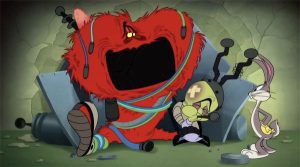 Bugs’s choices of screens are now down to a small white portable set, which tells him that the game is tied in the bottom of the ninth. Suddenly, the set is grabbed out of Bugs’ hands. Gossamer has returned, and crushes the set in his bare palm, compressing it into a sphere, with protruding red coiled wires appearing on its outside that resemble baseball stitches. Bugs quickly switches into baseball attire, and takes up the chatter of the game announcer where it left off. Before Gossamer can figure out who or where he is, Bugs hands him the crushed TV set as a ball, tells him the pitch count, and flashes him signals as a catcher to throw his famous Gossamer twister ball. Gossamer nods, and throws with gusto. Bugs plays both batter and catcher, missing the swing, catching the ball, and calling “Strike one!” Suddenly, with a bit of change in wordplay, Gossamer is told he is now the batter. Bugs plays dual roles again, throwing a fast one past the monster for “Strike two.” The scientist chooses this moment to return and see how things are going. Bugs quickly screams to him that the team needs him, hands him the ball, and points him to the mound to pitch. Some wonderful shots show the ballistic perspiration of both scientist and monster, as Bugs continues with announcer banter about the whole game and championship coming down to this one pitch. The scientist finally throws, and Gossamer whacks it. “Run! Run!” shouts Bugs to Gossamer – and likewise to the scientist to pursue him. “Slide, slide!”, Bugs screams. The two runners have little choice, as Bugs has coated the floor of a long corridor with grease. Gossamer clutches to his master in dread of what’s coming – as the end of the corridor is crowded with more electronic scientific gear. A mammoth crash, and the two evil-doers wind up in a tangled mess of technology, with a last picture screen wedged in Gossamer’s mouth. Bugs flicks on the broadcast, which is just ending. “Well, I missed the game…but that was one monster of a final play”, says Bugs to us for his closing curtain line.
Bugs’s choices of screens are now down to a small white portable set, which tells him that the game is tied in the bottom of the ninth. Suddenly, the set is grabbed out of Bugs’ hands. Gossamer has returned, and crushes the set in his bare palm, compressing it into a sphere, with protruding red coiled wires appearing on its outside that resemble baseball stitches. Bugs quickly switches into baseball attire, and takes up the chatter of the game announcer where it left off. Before Gossamer can figure out who or where he is, Bugs hands him the crushed TV set as a ball, tells him the pitch count, and flashes him signals as a catcher to throw his famous Gossamer twister ball. Gossamer nods, and throws with gusto. Bugs plays both batter and catcher, missing the swing, catching the ball, and calling “Strike one!” Suddenly, with a bit of change in wordplay, Gossamer is told he is now the batter. Bugs plays dual roles again, throwing a fast one past the monster for “Strike two.” The scientist chooses this moment to return and see how things are going. Bugs quickly screams to him that the team needs him, hands him the ball, and points him to the mound to pitch. Some wonderful shots show the ballistic perspiration of both scientist and monster, as Bugs continues with announcer banter about the whole game and championship coming down to this one pitch. The scientist finally throws, and Gossamer whacks it. “Run! Run!” shouts Bugs to Gossamer – and likewise to the scientist to pursue him. “Slide, slide!”, Bugs screams. The two runners have little choice, as Bugs has coated the floor of a long corridor with grease. Gossamer clutches to his master in dread of what’s coming – as the end of the corridor is crowded with more electronic scientific gear. A mammoth crash, and the two evil-doers wind up in a tangled mess of technology, with a last picture screen wedged in Gossamer’s mouth. Bugs flicks on the broadcast, which is just ending. “Well, I missed the game…but that was one monster of a final play”, says Bugs to us for his closing curtain line.
“Tra La La LAAAAAA!” That must be the fat lady singing. I guess it’s over, ‘cause – – – it’s OVER!!
